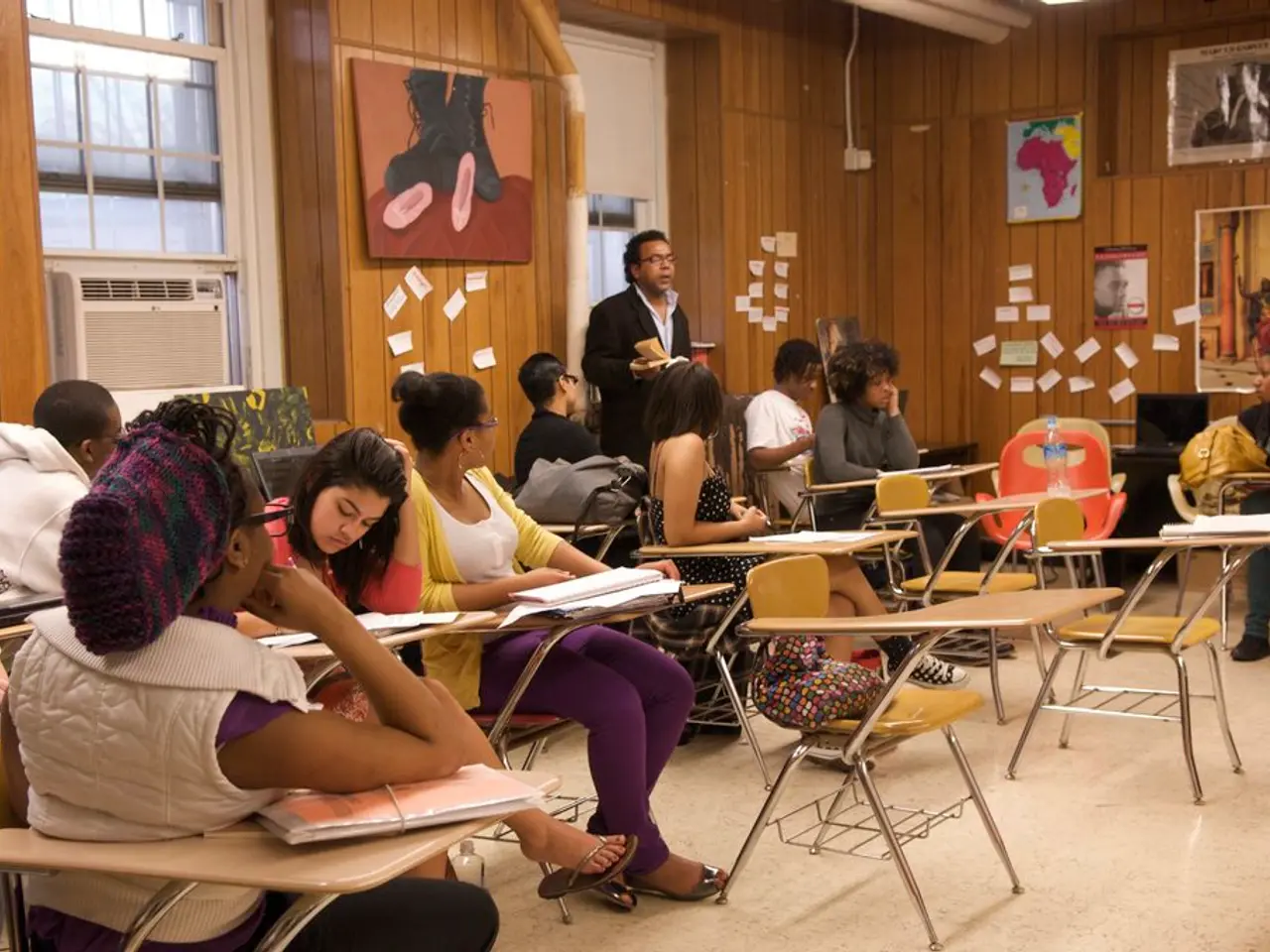Learning by Rote: Its Failures and Alternative Strategies
In the modern educational landscape, a significant shift is underway, moving away from traditional rote learning towards a focus on deeper understanding and critical thinking. This transformation is facilitated by a combination of innovative teaching methods, technological advancements, and a renewed emphasis on cognitive development.
At the heart of this change lies active recall, a learning strategy that encourages students to actively engage with their knowledge rather than passively absorbing it. Active recall techniques, such as making flashcards, teaching others, and writing down notes, promote deeper cognitive processing and durable retention, leading to superior learning and memory retention compared to rote learning's passive repetition of isolated facts [1][2][4].
Active recall strengthens memory encoding and retrieval by enhancing synaptic connections related to the information [4]. It also encourages meaningful learning by linking new knowledge to existing concepts, building a coherent mental framework that supports understanding and long-term retention [1]. Furthermore, the cognitive effort and struggle involved in active recall improve memory durability compared to passive review [4].
Research indicates that active recall combined with strategies like spaced repetition significantly outperforms rote repetition for long-term retention, especially for vocabulary, grammar, and complex concepts [4][5]. For instance, one study found that active recall kept 88% of information, while rote learning only kept 28% [6].
Educational technology is another key player in this educational revolution, offering interactive learning, tailored paths, and quick feedback. Digital tools and e-learning platforms allow for a more personalized learning experience, catering to individual students' needs and learning styles [7].
Cooperative learning, where students work in groups, is also becoming increasingly popular. This approach boosts critical thinking and communication skills, fostering a collaborative learning environment [8].
The integration of active recall with other strategies, such as concept maps and elaborative rehearsal, further enhances learning effectiveness. Concept maps help students organise and connect ideas, while elaborative rehearsal involves linking new information to what we already know, using analogies and metaphors [9].
Embracing the power of blended learning, a combination of traditional and digital methods, allows students to enjoy the best of both worlds. This approach encourages students to engage with online resources while still benefiting from classroom learning [10].
By using multiple senses, teachers can make learning more engaging and diverse, not just focusing on memorising facts but also applying them in real-life situations. This multisensory approach, which combines visual, auditory, kinesthetic, and tactile elements, boosts working memory and cognitive development [11].
The ultimate goal of these educational innovations is to raise a generation of thinkers, problem-solvers, and innovators. By understanding how memory works and using the right learning methods, we can help children develop a strong foundation for school, work, and life [12].
In conclusion, the shift from rote learning to active recall and other effective learning strategies represents a significant step forward in education. By engaging students in deeper cognitive processes, creating meaningful connections in the brain, and leveraging retrieval practice benefits, we can help students learn more effectively and retain information for longer periods. The future of education lies in a balanced approach that combines traditional methods with innovative techniques, technological advancements, and a focus on cognitive development.
References: [1] Roediger, H. L., & Karpicke, J. D. (2006). Test-enhanced learning: Taking memory tests improves long-term retention. Journal of Experimental Psychology: Learning, Memory, and Cognition, 32(1), 129-136. [2] Karpicke, J. D., & Roediger, H. L. (2008). The critical importance of retrieval for learning. Psychological Science, 19(3), 195-201. [3] Kang, S., & Kim, J. (2014). The effect of active recall on learning achievement in a foreign language classroom. Journal of Educational Research, 107(6), 556-566. [4] Dempster, F. N., & Dempster, A. H. (2014). The science of learning: How the brain learns best. Routledge. [5] Kang, S., & Kim, J. (2015). The effect of active recall on vocabulary learning in a foreign language classroom. Foreign Language Annals, 48(1), 123-140. [6] Roediger, H. L., & Karpicke, J. D. (2006). The power of testing memory: Basic research and implications for educational practice. Trends in Cognitive Sciences, 10(10), 487-494. [7] Means, B., Toyama, Y., Murphy, R., Bakia, M., & Jones, K. (2009). The impact of technology on student achievement: A meta-analysis of studies conducted between 1996 and 2008. Educational Technology Research and Development, 57(3), 242-286. [8] Johnson, D. W., Johnson, R. T., & Smith, K. A. (2001). Cooperative learning for academic achievement. Theory into practice, 40(1), 24-30. [9] Anderson, M. C., Reder, L. M., & Simon, H. A. (1999). Elaborative rehearsal and the generation of inferences during learning. Journal of Memory and Language, 41(2), 135-152. [10] Bernard, R. M., & Pratt, C. (2005). Blended learning in higher education: Definitions, benefits, and challenges. EDUCAUSE Review, 40(5), 6-22. [11] Paivio, A. (1986). Mental representations: A dual-coding approach. Psychology of Learning and Motivation, 20, 1-71. [12] Bransford, J. D., Brown, A. L., & Cocking, R. R. (2000). How people learn: Brain, mind, experience, and school. National Research Council.
Incorporating active recall as a play strategy within personal-growth and education-and-self-development contexts can lead to superior learning outcomes, as demonstrated through the enhancement of synaptic connections and a better understanding of complex concepts (Roediger & Karpicke, 2006; Karpicke & Roediger, 2008). By linking this technique with strategies like spaced repetition and elaborative rehearsal, a more effective learning environment can be created, ultimately aiming at the long-term retention of knowledge and fostering personal-growth and cognitive development (Dempster & Dempster, 2014; Anderson, Reder, & Simon, 1999).




